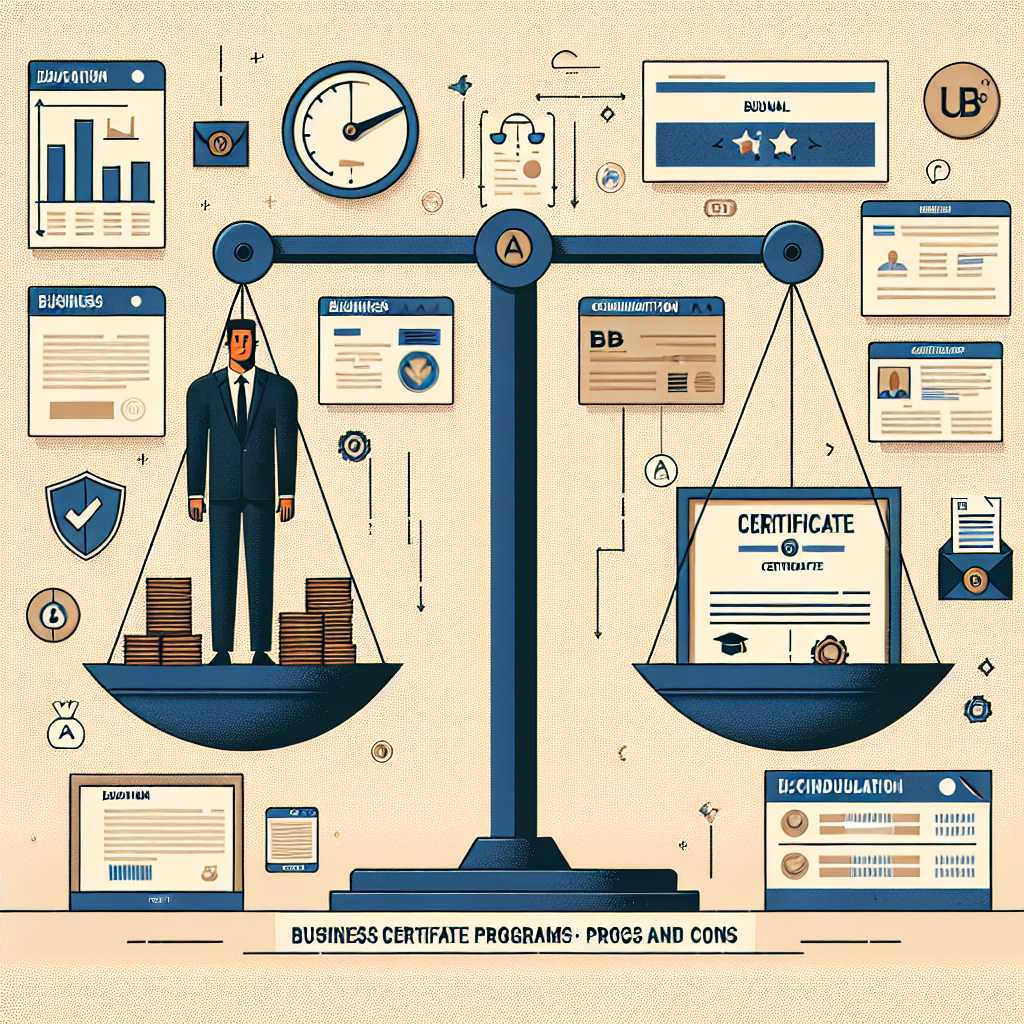Choosing whether to enroll in a short, skills-focused credential often raises questions about return on investment and long-term value. Business Certificate Programs: Pros and Cons Explained provides a practical look at what these programs offer, who benefits most, and the trade-offs compared with associate or bachelor’s degrees. This overview will help you weigh time, cost, and career impact before you commit.
Pros and Cons of Business Certificate Programs
Business certificates are compact educational packages designed to teach specific competencies—project management, accounting software, digital marketing, or basic finance—without the time and expense of a full degree. They can be an efficient way to gain job-ready skills or demonstrate continuing professional development. However, certificates vary widely in quality and recognition, and they don’t always substitute for the networking and depth of a degree program.
Key advantages
- Speed: Most programs take weeks to months, allowing quick entry into a new role or upskilling while working.
- Cost-effectiveness: Lower tuition and fewer associated expenses than degree programs.
- Targeted skills: Curricula often focus on practical tools and techniques employers seek immediately.
- Flexibility: Many certificates are offered online or in evening formats suitable for working adults.
Common disadvantages
- Limited depth: Certificates may not cover underlying theory or broader business contexts.
- Variable recognition: Employers may view certificates differently depending on the issuing institution.
- Fewer networking opportunities: Short programs typically lack the alumni networks and recruiting channels of larger degree programs.
- Potential redundancy: Multiple overlapping certificates may not stack into a clear career advantage.
Who benefits most from certificate courses
Certificates are best for people who need to demonstrate or update a discrete skill quickly—career changers, mid-career professionals seeking promotion, or small-business owners wanting practical tools. They’re also useful for recent graduates adding practical credentials to a degree. However, those seeking executive-level roles or academic careers should evaluate whether a certificate will carry enough weight compared with a bachelor’s or master’s degree.
Curriculum, quality indicators, and accreditation
Not all business certificates are created equal. When evaluating a program, look for clear learning outcomes, instructor credentials, and evidence of employer recognition. Accredited schools or industry-recognized certificates (from professional organizations) tend to have more credibility. Ask about career support services, hands-on projects, and assessment methods—these elements often predict whether a program will translate to real-world ability.
Practical versus theoretical training
Certifications focused on tools (e.g., CRM platforms, analytics software) teach immediate applications, while certificates with a managerial emphasis may incorporate leadership, ethics, and strategy. If your goal is job-ready technical competence, prioritize applied coursework and portfolio projects. If you want broader career mobility, seek programs that integrate soft skills and business fundamentals.
Cost, time commitment, and potential earnings
Certificates typically cost a fraction of a degree and require less time, making them a low-risk investment for many. That said, increased earnings after completion depend on industry, geographic market, and how well the credential matches employer needs. For labor-market data on management and business-related roles, consult official occupational outlooks like the BLS report on management occupations for trends and median wages: Occupational outlook for management occupations.
How to evaluate a program before enrolling
- Check instructors’ industry experience and academic background.
- Ask for exemplar student work, syllabi, or a sample module.
- Confirm whether employers in your target field recognize the credential.
- Compare time-to-completion and total cost against alternative training options.
Comparing certificates to degrees and other credentials
Certificates often complement degrees or serve as stopgaps when a full program isn’t feasible. If you’re considering switching into regulated or highly technical fields, investigate whether a certificate suffices or whether a degree is required. For adjacent academic pathways—such as programs leading toward careers in law—consider exploring related online degrees that align with your objectives; for example, resources about online legal studies degrees as a pathway to a law career can help you compare professional tracks and credential choices.
Stackability and lifelong learning
Some institutions design certificate modules to stack toward a degree, allowing learners to accumulate credits over time. If you value long-term flexibility, prioritize programs with clear articulation agreements or continuing-education options.
Short bulleted summary
- Pros: fast, affordable, focused skills, flexible formats.
- Cons: limited depth, inconsistent recognition, fewer networking opportunities.
- Best for: upskilling, career changers, working professionals needing targeted training.
FAQ
Q: Can a business certificate replace a bachelor’s degree?
A: Generally no. Certificates can supplement experience or education, but most employers still treat bachelor’s degrees as the baseline for many business roles. Certificates are more effective as targeted skill enhancements.
Q: How do I know if a certificate will help my job prospects?
A: Research employer listings in your target field to see if specific tools or credentials are requested, speak with hiring managers or alumni, and review program outcomes and placement data when available.
Q: Are online certificates as valuable as in-person ones?
A: Quality matters more than format. Reputable institutions with rigorous coursework, assessments, and instructor engagement can offer online certificates that are equally valuable to in-person offerings.



